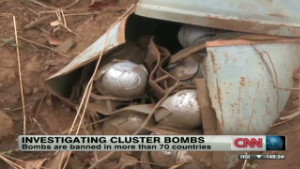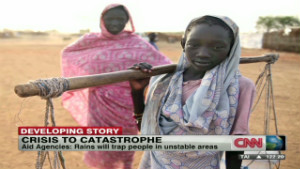Clottey interview with Rabie Abdelati Obeid, a prominent member of Sudan’s ruling National Congress
Rabie Abdelati Obeid said top on the agenda will be discussions on finding ways to resolve security challenges between the two neighboring countries. The recent conflict between Khartoum and Juba nearly brought the two countries to the brink of a full-scale war.
Both Sudan and South Sudan say they have agreed to find solutions to the border security issues in Monday’s talks. Sudan’s security minister and the interior minister are scheduled to meet their counterparts from South Sudan for the negotiations.
“[The meeting] will settle the issues of security regarding the withdrawal of the southern government army from the north, and also the Sudan Armed Forces to be withdrawn to the north,” said Obeid.
Obeid said the areas of negotiations include a joint border verification and monitoring mechanism, as well as establishing a safe demilitarized zone between the two nations.
The African Union and the United Nations have demanded both Sudan and South Sudan resolve issues stipulated in the 2005 Comprehensive Peace Agreement (CPA) ahead of an August 2 deadline.
Obeid said the government in Khartoum is committed to implementing the AU/UN peace plan for the two nations.
“The roadmap of the United Nations Security Council is accepted by our government, and even the agenda prepared by the African panel led by former South African President [Thabo Mbeki] is also accepted by our government. And we will not hesitate to follow what has been directed by the African panel,” said Obeid.
“If we settle this security issue… this will pave the way and create a healthy atmosphere for [the] settlement of the remaining issues; whether these issues are oil, Abyei, or the demarcation of borders or any other issues still pending.”
A previous round of talks broke down last month after deadly border clashes. Analysts say the recent fighting was the worst since the south broke away from its northern neighbor last July after decades of conflict.
Obeid said Khartoum seeks to resolve challenges with South Sudan in order to have strong relations with the country.
“This is actually our target. Our target is to establish good relations with the south and our target is to achieve peace and to create an atmosphere for all groups the live within the border between [the] south …and also to allow the movement of people between south and north that accompanied the relations between south and north,” continued Obeid.
“It was also our target when we signed the Comprehensive Peace Agreement in the year 2005 and this was crucial to us when we accepted the secession of the south on 9th July 2011. If it was not our target, we would not have signed the CPA [or] acknowledge the secession of the south.”
The U.N. Security Council passed a resolution ordering both sides to cease fighting and return to peace talks following concerns of a return to war.
South Sudan pulled its last 700 police officers out from Abyei by last Tuesday's deadline. The United Nations confirmed that Khartoum, too, had withdrawn troops from the disputed region.







